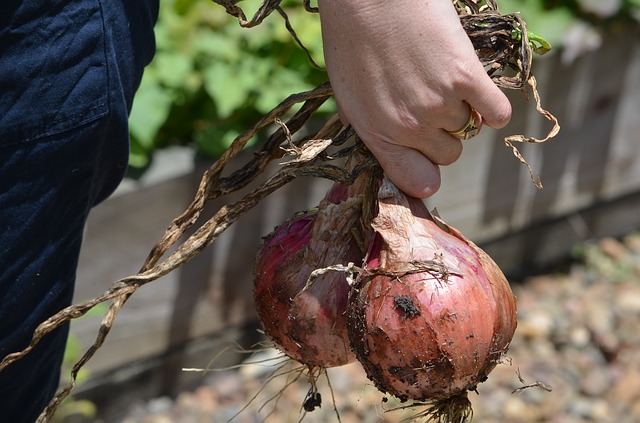
Chances are, you’ve probably at least heard, if not seen, organic foods at some point. It is fairly easy to see which foods are organic. These foods are not packaged the same and tend to cost much more. This article can help you save money by growing organic produce right in your own garden.
Include your kids in growing an organic garden. A garden can be a great learning experience for your children, and it gives you a chance to bond while producing healthy food.
Let your children be involved in your organic gardening efforts. A garden can provide a wonderful learning experience for children, and will give you an opportunity to bond with them while you produce healthy food.
Prepare the ground for a perennial garden quickly and easily. Simply slice into the ground with a spade, flip the top layer of soil, and then cover it with several inches of wood chips. Give this area at least a few weeks, then you can dig into the area and plant the new perennials.
Planting organic strawberries is a great way to encourage your children to get involved. Small kids enjoy picking fruit themselves out of a garden. Because of this, they’ll be more likely to provide you with some assistance in your garden if they feel like they’re receiving something out of this.
Believe it or not, pine makes great mulch. Certain plants are acidic, and thrive in acidic soil. For these types of plants, pine needles are wonderful for mulching. Simply add a layer of pine needles a couple of inches deep to the plant beds. The needles will decompose over time and provide the soil with acidity.
It is important to keep the temperature set between 65 and 75 degrees, if you wish to raise plants in the home. Indoor plants grow best at these warm temperatures. If your home isn’t that warm during in winter, try a heat lamp to use on your organic plants instead.
Be aware of spacing considerations when you are first planting your organic garden. Leave a little more space than you think your full grown plant will need to make up for overgrowth. Your plants will need the space not only because of their physical size, but also because the space will provide air circulation for the garden. Plot out all of these considerations before putting that first seed in the ground.
Before planting any perennials, you have to make the ground ready. Slice under the grass with a spade, flip the layer you have lifted over, and spread three inches of wood chips on top. After a few weeks, you may then utilize the area to plant your flowers.
Use an old laundry basket to gather your vegetables and fruits. A laundry basket will act as a strainer for your produce. While your freshly harvested fruits and vegetables are still in the basket, rinse them off and any excess water will run off through the laundry basket holes.
After your seeds have sprouted, heat lamps are not needed. As your baby plants grow, you can move them from their heat source. Take off any plastic that is on the containers to keep away from warmth and moisture. To know when it is time for this, keep a careful eye on your seeds.
When composting lawn clippings, leaves, and other materials, it is best to add the same amount of green, freshly-cut material as you do dried material. Add grass clippings, waste from fruits and vegetables, leaves, and weeds for the green materials in your compost pile. Examples of dried plant material are sawdust, shredded paper, straw, cut-up woody material, and cardboard. Certain substances will undermine your composting efforts and cancel out any benefits; these include meat, charcoal, ash or plants that have diseases or fungal growths.
Flower Beds
One unusual tip in organic gardening, is to “pet” your seedlings often. Use your hands or a piece of cardboard and lightly ruffle the seedling about one or two times a day. This sounds like total nonsense, but there is research suggesting that it does promote plant growth relative to unpetted plants.
Add three inches of mulch to your flower beds. This will help to inhibit weed growth, helps to lock in moisture, and adds needed nutrients to your organic garden. By adding mulch, you can give your flower beds a finished appearance.
If you want to sell your crops as organic, you should look into obtaining a certification proving that you are an organic garden. That way, you will realize greater sales volume and demonstrate the value of your produce to potential and returning customers.
When you are working in your garden, you will want to have all of your tools in a convenient location. Do not spend half an hour looking everywhere for a tool. Have all of your tools gathered and prepared for use before you work in the garden, and make sure to put them away neatly. Get a tool belt if you need to, or a pair of pants with a lot of pockets.
While organic gardening costs more and requires more effort, the produce that will come out of your garden will be healthier for you. While chemical-based gardening products make bold claims, it is hard to dispute that organic gardening consistently produces superior results.
Use plastic bags to cover muddy gardening shoes. This helps the flow keep going so that you can get into the garden quickly to finish what you’re doing.
Be aware of seasons and climates when you are watering, and change accordingly. Depending upon whether it is morning, noon or night, the chemical composition of your local water supply and soil type may determine your water usage needs. In warm climates with high humidity, for instance, plants often develop fungal infections when water is applied to the leaves. Rather, make sure the root system is watered.
Space is very important when you plant an organic garden. You can underestimate how much space you need when they are growing. Failure to provide adequate room will restrict growth because it forces plants to compete for valuable nutrients and oxygen. Plan your organic garden while keeping this in mind, and space your seeds accordingly, when planting.
Adding a lot of mulch to your garden is a great tip to implement in order to keep your garden healthy. A couple of inches of mulch will protect what lies beneath it. On hot, dry days, mulch keeps the dirt underneath cool and moist. This protects and nourishes plant roots. It helps the soil retain moisture longer by reducing the evaporation rate. This can also help control any weeds.
Laundry Basket
One of the most wonderful things about buying food that is organic is that they don’t contain pesticides. Although this is better for your health, you do need to check organic produce for infestation of bugs before eating it.
Use a laundry basket to help you collect produce from your garden. The basket strains the produce as well as stores it while you are going through your garden. You can clean and rinse the harvest when it is the laundry basket and the water will go out of the holes.
Feeling in harmony with the earth is a benefit of gardening as a hobby, and this holds especially true when it comes to organic gardening. You will be a witness of the growing process of many different plants and understand how a whole ecosystem functions.
Growing your garden at home might not be the most convenient thing for you, but you will save a lot of money and always have the confidence that what you’re eating and feeding your family is as fresh and as healthy as possible. Use the tips you’ve learned here and get started on your garden today.
Make sure you actually take a look under the surface of the dirt at the roots of your plants before you transplant anything into your garden. Look out for green starts that are lush that might have bad root systems when you start purchasing tomato seedlings to help your organic garden prosper. The reason that these starts will still look green with bad roots is because the seedlings will not grow until the starts are gone.
Many people want to find out more about soft down alternative pillow soft
nurse home waterproof mattress protector
DAHUA starlight Network Camera
encasement mattress protector, but they don’t know where to start. This article, luckily, is exactly what you need for that. Just put all this advice to good use.














